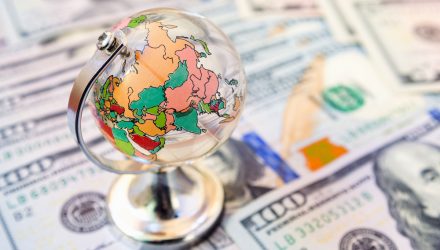International ETFs and the related equities have long trailed U.S. equivalents. Part of the reason for that long-running laggard status might be investors assuming that simply because a company is based in a particular country, it’s highly dependent on its home nation for the bulk of its revenue.
In reality, that’s not always the case, and as more market participants awaken to that fact, ETFs such as the Calvert International Responsible Index ETF (CVIE) could benefit. Consider the following: Members of the Morningstar US Market Index generate 39% of their sales outside the U.S., according to the research firm.
As Morningstar Indexes strategist Dan Lefkovitz pointed out, companies from Australia, Canada, Japan, and most of Western Europe depend on other jurisdictions beyond their home nations for larger slices of sales. In fact, many European companies generate more revenue in the U.S. than in their home continent.
Good News for CVIE
CVIE is pertinent in this conversation not because of its status as an ex-U.S. developed market ETF, but also because of its geographic mix. Japanese stocks account for almost 17% of the fund’s weight while Canadian and Australian equities combine for 15%. Plus, CVIE has significant Europe exposure. The fund plays the underappreciated theme of increasingly globalized revenue streams.
“Globalizing revenue sources have likely contributed to equity markets moving in lockstep. Developed markets, which are the most globalized, are more correlated with each other than emerging markets are with developed markets,” added Lefkovitz. “To bring this concept to life, think about biopharma companies. Whether they’re based in the U.S., France, Switzerland, or Japan, they are exposed to many of the same forces.”
Another reason to consider CVIE is that the ETF gives investors an opportunity to invest in what they know — a style extoled by famed investors such as Warren Buffett and Peter Lynch. Said another way, American investors are already using plenty of products made by some CVIE member firms. They might as well profit from that consumption.
“I live in the U.S., but my kids play Nintendo on a Samsung TV; I fill up my Japanese car at a British gas station; I fuel myself with a Swiss coffeemaking machine, then go running in German shoes. In investing, it makes sense to broaden the opportunity set to the fullest,” concluded Lefkovitz. “There are unique companies, industries, and growth drivers that you can’t get access to through a purely domestic portfolio.”
For more news, information, and analysis, visit the Responsible Investing Channel.

